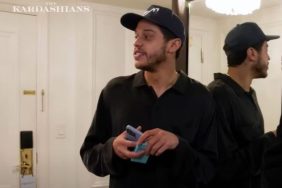You’ve had a unique viewing position for the rise of EDM culture in America.
As far as the EDM thing, that’s been interesting as well because I threw myself into the fire doing this tour in 2011 called Identity. It was the absolute peak of dubstep and brostep. I was on the same stage as Datsik and Skrillex… that whole world, that was like the Summer of Dubstep in the States. Just being around that energy and seeing how it works, and seeing what you need to do to make that crowd go – that was able to inform me when I was playing for Bassnectar at Red Rocks and stuff like that. By the time those events started happening, I felt like I knew what to play and what not to play in that kind of setting.
My feeling on music is that if you’re not a student, if you’re not constantly in class and realizing there’s no such thing as being finished with that… you’re constantly learning, you’re constantly figuring out how to evolve and adapt. There’s no “I’ve arrived, I’ve made it, I don’t need to keep growing. I am who I am and people know, and that’s how it’s going to be.” If you have that mentality, you’re never going to stay at that level.
Seems that versatility is the primary necessity in success.
Right. Like we touched on earlier, four years to me at age 42 might not seem that long, but if you’re 18 and you’re out at a show and you’re doing something that seems a year out of date, forget it. You’re done. If youre not switching it up and staying ahead of things, it’s not gonna work for you. I feel like the trick is… there’s still a message I’m trying to send in my sets. I, as DJ Shadow, am not gonna go up there and try to rock the stage with Beat Port number one hits. That’s not who I am. I want them to move, but I want them to meet me halfway. I’m always, constantly curating sets that reflect my own identity, not someone else’s.
That’s important, as your name continues to be referenced with such reverence. Far moreso than other names out there, but you’re able to glide across the top of it all. The universal respect, the reverence for the DJ Shadow name in all quadrants is fascinating to watch as a fan as it’s evolved and changed.
Thanks, I think that even early on, in UK interviews way back, I identified more with movie directors than record producers. Movie directors call all the shots and make the magic happen, but they can walk down the street and nobody knows who they are. I most identified with directors that eventually you say, “Oh, it’s a (blank) movie,” and you know ok cool, they don’t just to action movies or horror or big budget blockbuster type movies, they do a little bit of all of it. Those are the type of directors, even like Coppola or Woody Allen.. you kind of know what you’re getting with a Woody Allen movie, but at his peak, every movie was different. You don’t just go to see a certain kind of romantic comedy movie, you’re going to see a Woody Allen movie. You know it’s going to be of a certain quality, quirky and different and a little bit left of the mainstream.
In terms of Liquid Amber, do you have a game plan or high level goal?
Not really, it’s not like we mapped out what we hoped to achieve year to year. I really just started the label for it to be an outlet and resource for the musicians I’m already playing and respect. I think a lot of reasons labels like this are successful is because they give people a window into what they should be listening to. It makes it easier for people. What’s out on Saturate or Lucky Me? Any of these labels that I pay attention to. Mute back in the day… there’s a lot of labels I look to that I really respect, they do things at a certain quality or professionalism and stature. I want to have fun with it, not grow too fast, but at the same time definitely would like to be a factor in this space. Whatever space that is. I want it to be seen as an artist haven, a label that talks across to the fanbase and the peers that are playing the music as opposed to talking down.
You’ve got quite an attentive audience waiting to see what’s coming next…
Yeah, we have two things lined up, waiting their turn. I wish we could get stuff out faster, but I know how much time I spend on the label every day. There’s a lot of stuff you have to do, you’ve gotta coordinate the artwork, coordinate all the PR, all the marketing, make sure the artist is involved and informed with what’s going on, get the mastering done… There are a million things to get done. Right now it just feels good, it just feels good to do.
That’s great with so many moving parts, especially on the promotional end where so many factors can go awry, that can put a different face on it than you intended. So now that you have a higher level of control there…
I think the key for me is to let everybody involved in the operation play to their strengths, and not try to micromanage every single finite aspect of it.
How do you value music in our culture, given how different our value systems are now in society from when we were kids?
When I travel, I always bring a book to read about things happening, whether it be current or old things, to stay on point just for that. Whether you read about the genesis of punk rock, or a really good James Brown biography I read – I really didn’t want to read that one, because I thought I knew everything about him, but it was really good. Love Goes to Buildings on Fire, which is basically New York between ’73 and ’77 or so. So the point is that I think without question there have been times where music has been the leading form of entertainment culture in this country. You could argue that today tech is the leading culture definer. So music and film have diminished in terms of their cultural weight. In the ‘60s and ‘70s kids used to run away from home based on their musical pursuits.
If you think about the passion involved with the early day sof cultures like punk rock and hip-hop and stuff like that all over the world… I don’t thnk that’s the case anymore. There’s a lot of people who still love music, but I think there’s no question as one thing rises and something else falls, there’s a tangential relationship between the two. People’s disposable income is used on tech now. That’s just the way it is now, so if someone had a $30 budget for music, now that $30 budget is for leveling up their apps or whatever.
I can’t read any crystal ball, and my opinions on the subject swing wildly back and forth based on what’s happening that year or that moment. I would say I was at my most downbeat on the subject around 2008 or 2009 because all the record stores were closing, but finding music on the internet wasn’t as cut and dry as it is now. It wasn’t easy. So without any kind of say on my part, I was losing the ability to pursue music that I love.
That’s not the case anymore with the rise of Soundcloud and so many other great sites for discovering music. I’d say that things are better now than they’ve been in a long time. We still need to figure out ultimately how these artists can make a living. It’s not a one-size-fits-all system. Not everyone wants to be on the road nine months a year to make a living on music. That needs to be addressed, but I feel like things are settling down a bit and all this stuff will be addressed. But for now it’s just a matter of keeping the faith as an artist or musician, and keeping the faith. Keep being creative, keep pushing ahead. And control what you can control. There’s a lot you just have to throw your hands up and say “it used to exist, but it doesn’t exist anymore, so let’s move on.”
Pragmatism seems to be a mandate for survival, these days.
Totally.
Keep up with DJ Shadow at his official site, and on the Liquid Amber imprint, as well as Twitter and Facebook.









